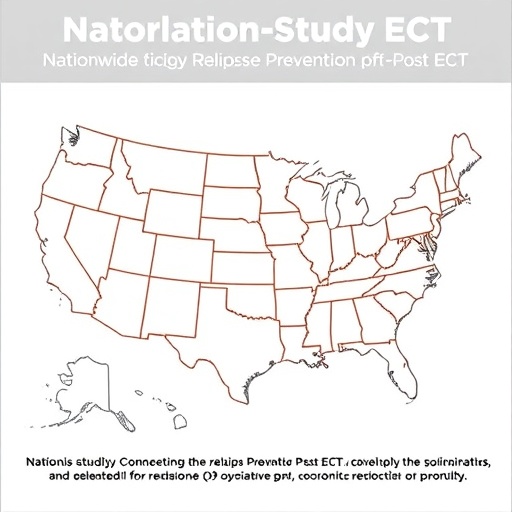In a groundbreaking nationwide cohort study published in Translational Psychiatry, researchers have delivered unprecedented insights into the real-world effectiveness of pharmacological treatments aimed at preventing relapse following electroconvulsive therapy (ECT) for individuals suffering from major depressive disorder (MDD). This extensive analysis, conducted by Kronsell, Nordenskjöld, Bodén, and their colleagues, addresses a critical gap in mental health treatment by evaluating relapse prevention strategies post-ECT, which remains one of the most potent interventions for severe, treatment-resistant depression.
Major depressive disorder is a pervasive and debilitating condition globally, and while ECT is often employed as a last-resort but highly effective treatment, the challenge has consistently been to maintain remission and prevent relapse after completing ECT sessions. Despite the efficacy of ECT in inducing swift symptomatic relief, relapse rates remain alarmingly high within months following treatment cessation. Until now, comprehensive, real-world data on adjunct pharmacological strategies post-ECT have been sparse. This study leverages nationwide registries to furnish a rigorous, large-scale understanding of how different medication regimens fare in sustaining remission.
The team meticulously analyzed patient data encompassing thousands of individuals diagnosed with MDD who underwent ECT, capturing a broad and representative sample throughout the country’s healthcare system. By tracking these patients longitudinally, the researchers identified patterns of pharmacological treatment initiated post-ECT and correlated these with relapse incidence over an extended follow-up period. This real-world evidence approach uniquely allows examination beyond controlled clinical trials, reflecting everyday clinical complexities, comorbidities, and adherence variables often seen in routine care.
Findings from the study reveal nuanced, clinically actionable insights. Certain classes of antidepressants, particularly serotonin-norepinephrine reuptake inhibitors (SNRIs), demonstrated a statistically significant protective effect against relapse compared to selective serotonin reuptake inhibitors (SSRIs) or no pharmacological follow-up treatment at all. Interestingly, the addition of mood stabilizers or atypical antipsychotics, frequently prescribed off-label to mitigate mood fluctuations, showed mixed results; some combinations enhanced relapse prevention, while others conferred minimal benefit, elucidating the necessity for personalized pharmacotherapy decisions.
Mechanistically, the superior performance of SNRIs post-ECT may relate to their broader neurotransmitter modulation capability, affecting both serotonin and norepinephrine pathways, which potentially stabilizes mood more comprehensively. This insight aligns with neurobiological models suggesting multi-system involvement in MDD pathophysiology and might explain differential responsiveness observed clinically. Moreover, the data underscore the importance of maintaining pharmacological coverage immediately after ECT to support neuroplastic changes and sustain symptom remission.
The study also highlights critical timing considerations around pharmacological treatment initiation. Early commencement of antidepressants following ECT correlates with reduced relapse risks, advocating for seamless transition strategies between ECT cessation and medication stabilization. Delays or interruptions in medication adherence emerged as potent predictors of relapse, reiterating the significance of integrated psychiatric care models and patient education to optimize long-term outcomes.
One of the most striking revelations of this research is the heterogeneity among patients’ responses to post-ECT pharmacotherapy, emphasizing the complex interplay of genetic, environmental, and neurochemical factors influencing treatment durability. The authors propose that future investigations should explore biomarker-driven personalized treatment algorithms, utilizing genetic profiling or neuroimaging to predict optimal relapse prevention regimens tailored to the individual’s neurobiology.
In terms of broader clinical implications, this nationwide cohort study advocates for reevaluation of current treatment guidelines that often lack consensus regarding pharmacological strategies after ECT. Healthcare providers may need to reconsider relying exclusively on SSRIs and instead contemplate integrating SNRIs or combination therapies routinely in post-ECT protocols. Such paradigm shifts hold promise to reduce the high relapse rates that plague many patients who experience the initial benefits of ECT.
Additionally, this research paves the way for policymakers to allocate resources effectively by recognizing the importance of continuous pharmacological support and monitoring following ECT. Optimizing relapse prevention not only improves patient quality of life but also attenuates the economic burden associated with recurrent depressive episodes, frequent hospitalizations, and extended disability.
The strength of this investigation lies in its robust methodological framework, utilizing nationwide data that encompass varied demographic groups and clinical presentations, enhancing the generalizability of the findings. This contrasts starkly with smaller-scale, often highly selective clinical trials that may underrepresent real-world complexities such as polypharmacy, comorbid conditions, and treatment non-adherence.
Importantly, while the study offers valuable pharmacological insights, it also signals caution against one-size-fits-all approaches. The observed variability in response necessitates continued attention to patient-specific factors, such as prior treatment history, concurrent medical conditions, and psychosocial environments, all of which intricately influence relapse susceptibility and pharmacotherapy effectiveness.
The implications for future research are profound. As the mental health field embraces precision medicine, integrating large-scale observational data with biomarkers and machine learning analytics could revolutionize relapse prevention strategies post-ECT. Such integrative frameworks may enable clinicians to customize treatments dynamically, minimizing therapeutic inertia and maximizing sustained remission probabilities.
In conclusion, this real-world, nationwide cohort study by Kronsell and colleagues constitutes a vital contribution to psychiatry, elucidating evidence-based pharmacological approaches to preventing relapse after ECT for major depressive disorder. By synthesizing expansive patient data with rigorous analytic methods, the work challenges current paradigms and provides a foundation for refined, individualized treatment models aimed at long-term recovery stability for those enduring severe depression.
Subject of Research:
Pharmacological treatments to prevent relapse following electroconvulsive therapy in major depressive disorder.
Article Title:
Real-world analysis of pharmacological treatments to prevent relapse after electroconvulsive therapy for major depressive disorder: A nationwide cohort study.
Article References:
Kronsell, A., Nordenskjöld, A., Bodén, R. et al. Real-world analysis of pharmacological treatments to prevent relapse after electroconvulsive therapy for major depressive disorder: A nationwide cohort study. Transl Psychiatry (2025). https://doi.org/10.1038/s41398-025-03746-0
Image Credits:
AI Generated




